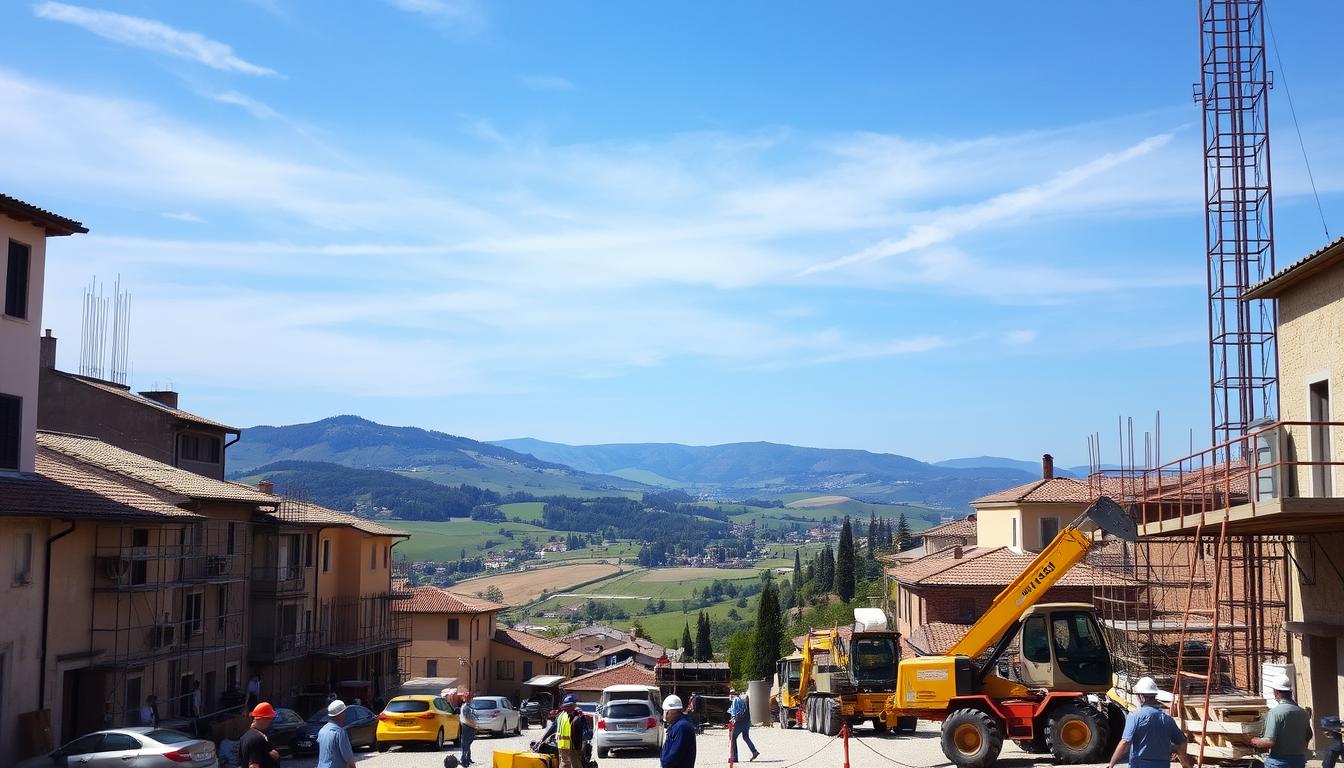“The only way to do great work is to love what you do,” said Steve Jobs. This quote inspires many to follow their dreams. Starting a construction company in Italy is a great idea, thanks to the country’s strong position in Europe and its recovering economy.
Italy has over 487,000 construction companies, making it a lively place for new businesses. This environment is perfect for entrepreneurs from abroad who want to make a difference.
In this guide, we’ll cover the key steps to start a construction company in Italy. We’ll look at the legal and financial aspects, as well as creating a solid business plan. Our aim is to prepare you for the challenges and opportunities that lie ahead.
Understanding the Italian Business Landscape
Getting to know the Italian business scene is key for those thinking of starting a business here. Italy is the 8th biggest economy globally, with big opportunities in making things, food, design, and research. The economy has bounced back a bit, growing by +0.1% in the first quarter of 2021.
Recently, wholesale and retail trade have grown fast, about 1.75% each year. This growth is thanks to government efforts to help businesses grow. They’ve set aside 30.57 billion euros to boost innovation in the private sector.
Italy is a top player in exporting goods worldwide. It’s the 2nd biggest exporter of wine and footwear, 3rd in fashion, and 4th in furniture. The mechanical machinery sector is worth around 80 billion euros, showing the variety of business opportunities in Italy. New businesses have jumped by 14% in the last year, showing a strong entrepreneurial spirit.
Even with the pandemic, Italy’s construction market is doing well. It’s expected to grow to USD 354.32 billion by 2030. The government is investing in new roads and railways, opening up more chances in construction. These facts highlight a lively business scene in Italy, full of chances for growth and success.

The Benefits of Starting a Construction Company in Italy
Starting a construction company in Italy has many benefits. The country has a well-organised logistics system, making it easy to work on projects. Italy’s rich history also offers unique chances to mix old and new in construction.
Italy’s strong manufacturing base makes it easy to find materials. Being the third-largest economy in the Eurozone, it offers stability for businesses. This stability is key for building strong partnerships with local suppliers.
The Italian government welcomes foreign investments, creating many opportunities. Sectors like mechanical machinery and renewable energies are growing fast. This means we can find new markets to explore. The rise of e-commerce also opens doors in IT and online services.
Italy’s location in the Mediterranean is another big plus. It connects us to markets in Europe, the East, and Africa. With a corporate tax rate of 24% and investment incentives, starting a construction business here is very appealing.
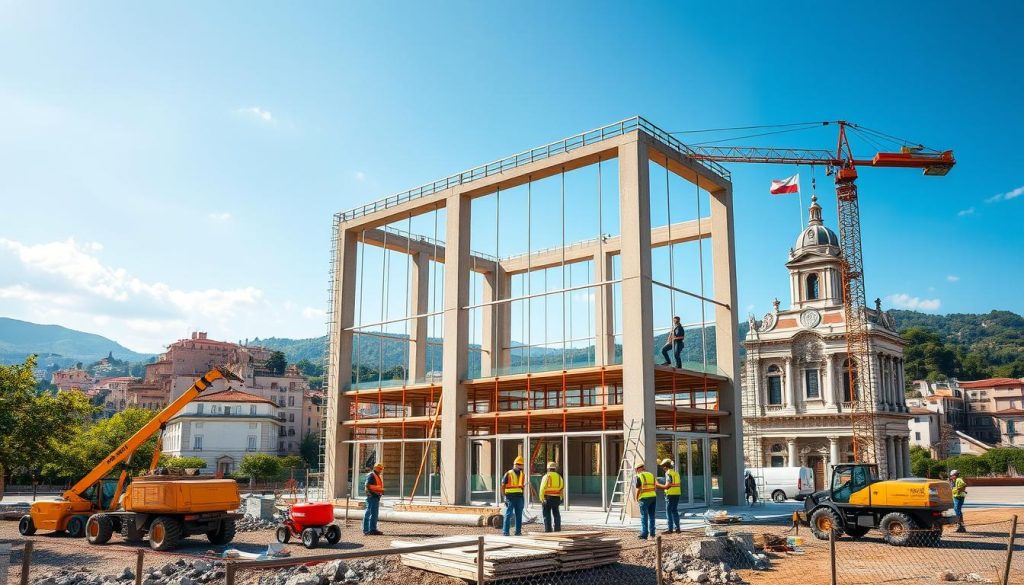
Legal Requirements for Starting Your Business
Starting a business in Italy means knowing the legal rules to follow. First, we need to write the Articles of Association. This document explains how the company is run. We also get an Italian tax number, called Codice Fiscale, for tax purposes.
Next, we must get the right permits for our construction work. Each area in Italy has its own rules. It’s important to check these local laws. Following these rules helps us succeed.
Also, if we use tower cranes, we need an Oversail licence. We must follow the Construction (Design and Management) Regulations 2015 for safety. Knowing these legal steps helps us start our business on the right path.
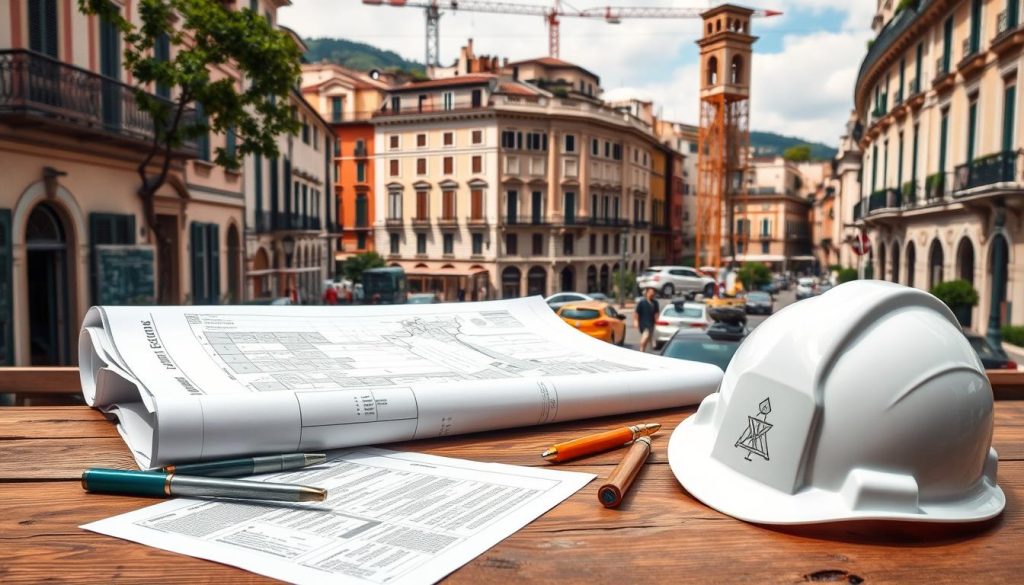
Choosing the Right Business Structure
Choosing the right business structure is key for construction entrepreneurs. It affects our liability and taxes, shaping our place in Italy’s business world. Knowing the different types of companies in Italy helps us make smart choices.
Sole proprietorship is a common pick, with many new construction firms going for it. It’s simple and cheap to start, letting us keep most profits. But, it can be risky, especially when getting credit or loans.
Partnerships are a team effort. They suit firms wanting to share duties. Around 15% of businesses go for this, helping with growth and decision-making.
Limited Liability Companies (LLCs) are the top choice, with 40% of new construction firms picking them. They protect our assets well and offer flexible taxes. This makes them a favourite for many in construction.
Corporations are less common but offer strong legal protection and can attract investors. About 15% of construction firms choose this, especially those looking to grow big.
Whichever company type we pick, getting advice from a skilled CPA is vital. They help us understand our chosen structure and its specific needs.
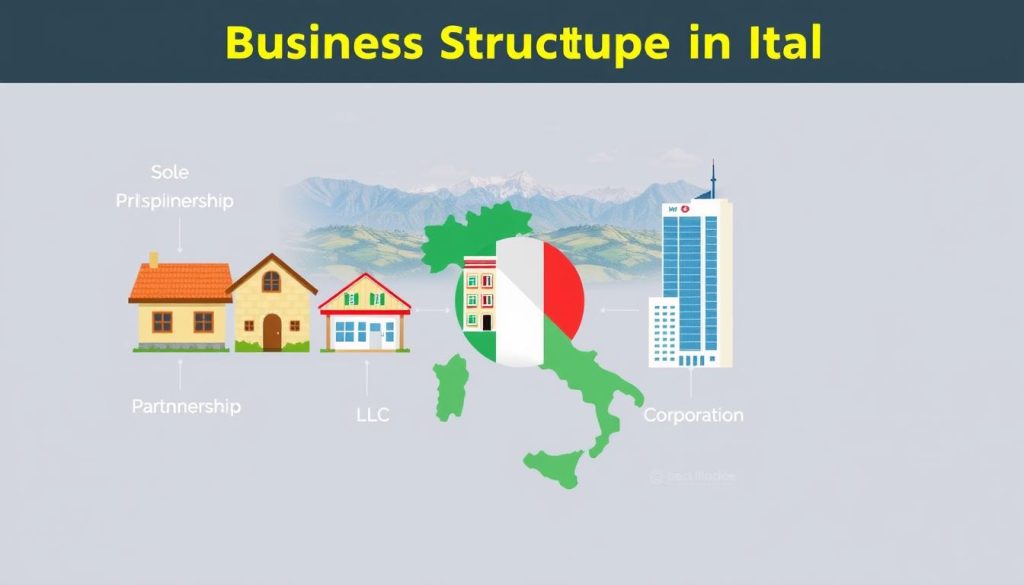
Cost Considerations for Establishing a Construction Company
Starting a construction company in Italy comes with many financial challenges. It’s key to know the costs involved to ensure a business can grow. The initial costs can vary from €5,000 to €50,000, based on the company’s size and services.

In the first year, you might spend about €5,650. Each year after, costs could be around €1,850. These costs include fees for setting up the company and getting it registered. You’ll also need insurance, like public liability and employers’ liability.
- Direct Costs: Heavy equipment, materials, and labour are big expenses.
- General Conditions Costs: These cover preconstruction and project operation costs, helping manage the project.
- Professional Fees: Consulting, architectural services, and permits are needed for legal and project execution.
- Utilities and Taxes: Don’t forget about gas, water, electricity, and local taxes in your budget.
- Contingency Funds: Save 3-10% of your budget for unexpected costs.
Knowing these costs helps us plan a solid financial plan for our construction company. Good financial management is crucial. It helps track cash flow and control costs. This way, we can succeed in Italy’s competitive construction market.
Preparing a Business Plan for Your Construction Company
A well-structured business plan is key to our construction company’s success. It must cover several important areas to stand out in a tough industry. Most financial lenders need a detailed plan before they lend money.
First, we do a deep market analysis and look at our competitors. This helps us spot trends and be different from others. We can then set prices that work well for us.

Financial projections are another crucial part of our plan. They show us what we might earn and spend, which lenders and investors find reassuring. We need to forecast our costs, expenses, and how profitable we’ll be.
A good business plan helps us get funding and attract great staff. It shows our vision and growth plans. It’s also important to include safety and training plans to keep a good company image.
- Executive summary
- Company identity
- Products and services
- Market analysis
- Competition analysis
- Marketing strategy
- Financials
- Partners
- Goals roadmap
Our business plan should be 15 to 20 pages long, but can be longer for investors. Each part must cover key points like licenses and insurance for workers.
In short, planning for a construction company needs careful thought and strategy. Getting help from experts can make our plan better fit our goals.
Necessary Licences and Permits
Starting a construction company in the UK means knowing about the permits and licences we need. We must get planning permission first. This makes sure our projects fit with local rules about land use.
We also need other permits, like:
- Building control approval
- Environmental permits
- Highways permits
To get these permits, we have to submit detailed plans. This includes architectural drawings and environmental impact assessments. The cost of permits depends on the size and complexity of our project.
Not following building rules, health and safety laws, and environmental laws can cause big problems. This includes fines, delays, and harm to our reputation. Getting these permits can be hard. Working with experts can help us through this process.
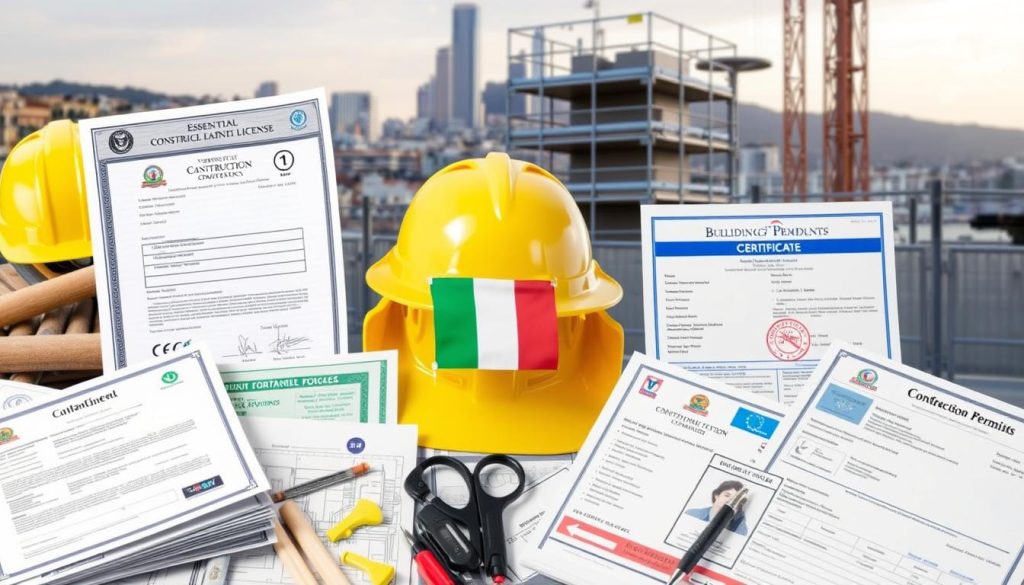
Navigating Taxation and Financial Obligations
Understanding taxes in Italy is key for business success. In the construction sector, we have to deal with many financial tasks. These include VAT, income tax, and payroll compliance, all crucial for smooth business operations.
Construction has its own accounting rules. The Percentage of Completion Method (PCM) and Completed Contract Method (CCM) are designed for our industry. Using these methods helps match income and costs, solving problems with long projects.
Sales tax rules change based on how we buy materials. We must also consider state taxes and property taxes, especially for heavy machinery. These taxes add complexity to our financial duties.
Managing payroll tax is vital for construction firms with a large workforce. Keeping accurate records and planning for employment taxes is essential. This helps avoid penalties and interest from not following the rules.
Getting help from tax experts in construction accounting is wise. They can help us follow the rules and support us during audits. Regular training keeps our finance team up to date with tax laws, promoting a culture of compliance.
Keeping up with tax changes is important. Initiatives like Making Tax Digital (MTD) help us manage cash flow better. Using MTD-compliant software makes invoicing and expense tracking easier, reducing errors.
Using cloud-based accounting software improves our work with finance experts. It gives us instant access to important financial data. This helps us report on time and make better decisions, driving our business forward.

Obtaining a Business Visa to Operate Legally in Italy
For non-EU citizens, getting a business visa is key to starting a construction company in Italy. We must know the different visas available. The Startup Visa is for new, innovative startups. The Self-Employment Freelance Visa lets independent entrepreneurs work freely. Each visa has its own rules.
- Showing we can financially support ourselves in Italy is important.
- We need to prove we have a place to stay in Italy.
- Our business plans must follow Italian laws.
Work visas in Italy are for jobs lasting more than three months but less than two years. For seasonal work, permits can last from two to nine months. We should plan for the time it takes to process these applications, usually two to three months.
It’s not just about getting a visa to legally operate in Italy. We must follow rules on foreign investments and local laws. This includes tax and business licensing. Working with legal advisors who know Italian business law can help us meet these requirements.

Getting an EU Blue Card is another good option. It’s for professionals with a job offer paying at least €2,033.22 after tax. This card can lead to bigger benefits, like getting residence permits that grant long-term EU residency after 18 months.
In short, getting a business visa for Italy requires careful planning and the right documents. Understanding these rules helps us set up successfully in Italy’s construction market.
Attracting Clients and Marketing Your Construction Company
A strong marketing plan is key for a successful construction company. With 81% of people checking local businesses online, having a good online presence is essential. Our website must be easy to use on mobiles, as 50% of searches start on them.
Using local SEO can boost our ranking in the areas we serve. We should focus on Google My Business and Yelp to get good reviews. Without a professional website, 56% of people won’t trust a business, showing the importance of a good website.
- Being active in local events and sponsorships helps us get noticed.
- Referral programs encourage happy customers to spread the word.
- Being eco-friendly attracts clients who care about the planet.
Email marketing can be very effective, earning $36 for every $1 spent. New construction firms should spend 12-20% of their revenue on marketing. If money is tight, direct mail can still work well if aimed at areas we’ve already served.
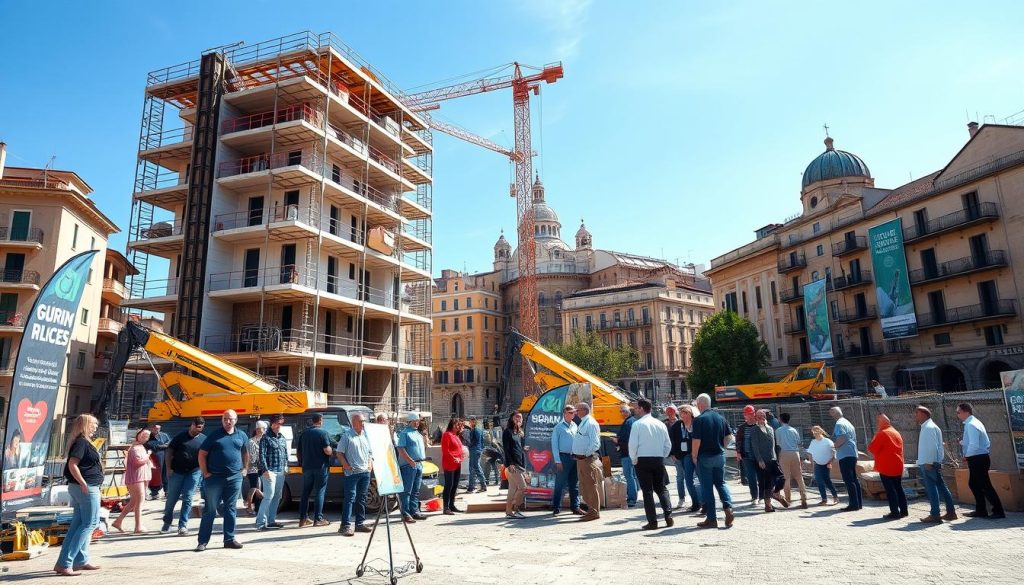
Not using digital marketing is a missed opportunity for 38% of construction firms. A good website can help us compete with bigger companies. By focusing on these strategies, we can attract clients and grow our construction company.
Building a Skilled Workforce
Our construction company’s success depends on a skilled team. The UK needs more construction workers, with a gap of 251,500 by 2028. We’re working hard to find and keep top talent.
We focus on training and development to attract the best. Apprenticeships offer £1,000 for hiring 16-19 year olds or those with extra needs. NHBC’s fast-track apprenticeships let apprentices start working sooner. CITB grants help us train our team, investing in their skills.
Keeping in touch and training regularly is key. We set clear goals for our team. Training and safety programs keep everyone safe and productive. Regular checks ensure we meet safety standards.
The ageing workforce is a big challenge. We offer good pay and chances to grow to attract young people. Career paths and mentorship make construction careers appealing.
Technology and innovation are important for attracting talent. We use project management software to work more efficiently. Joining local job fairs and offering internships helps us reach more people.
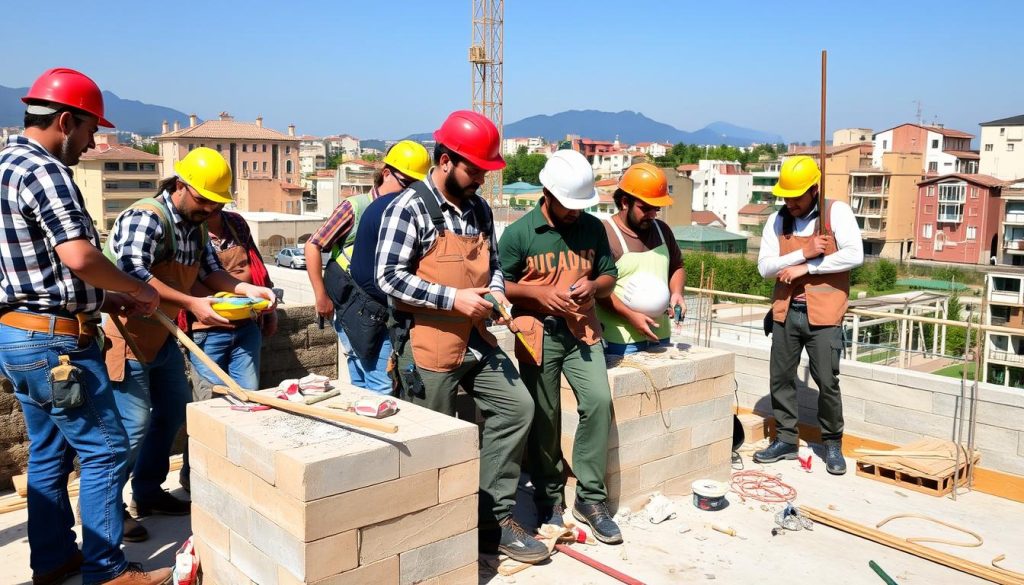
In short, our success is built on a skilled team. We create a welcoming workplace and show our values. This attracts people who want to help shape the future of construction.
Establishing Relationships with Local Suppliers
Building strong relationships with local suppliers is key in the construction industry. Today, companies often buy parts and services from suppliers. This improves the quality of what they offer. A good supply chain can cut costs and help finish projects on time, which is vital for our success.

To build a strong partnership with local suppliers, we need to focus on a few important strategies:
- Transparent Communication: Clear and honest talks avoid misunderstandings. This helps us reach our goals better.
- Supplier Relationship Agreements: These agreements set out prices, discounts, and payment terms. They make things clear and help save costs.
- Quality Assurance: Having clear quality standards in agreements is crucial. It makes sure the materials meet our standards, keeping projects reliable.
- Legal Protections: Adding clauses for intellectual property rights protects us. It builds trust and keeps things fair.
- Continuous Improvement: Keeping an eye on innovation in agreements can help both sides grow. It makes the partnership stronger.
It’s vital to watch out for risks in our supplier relationships. Risks are part of business, but being proactive helps us stay strong. As shown, 85% of businesses work hard to spot and deal with potential problems in their supplier partnerships. This helps us handle any issues that might affect our work.
Also, 92% of businesses see the importance of good supplier relationships for growth. We should make sure feedback is always welcome—75% of successful partnerships do this. Being able to talk things through helps us work better together and keep our goals in line.
By being fair and following our agreements, we build trust and respect. With careful attention, our partnerships with local suppliers can be very beneficial. This is crucial for the success of our construction projects in Italy.
Understanding Italian Bureaucracy and Regulations
Entering the construction sector in Italy can be challenging. Knowing the key business regulations is essential. Italy has many laws covering construction, safety, and employment. Following these laws is crucial to avoid penalties and ensure smooth operations.
The Decreto Salva Casa has changed how we deal with business regulations. It makes it easier to follow only the current rules. This simplifies the process, making it less complex and time-consuming.

For older properties, built before 1977, the decree offers more flexibility. Now, you can legalise changes with a technical expert’s approval. This can increase property value, which is great for foreign investors.
The Decreto Salva Casa also makes it easier to change property use. Homeowners can make certain improvements without needing permission. This can improve property quality and make it more attractive.
However, some worry about increased real estate speculation and safety risks. These changes could impact urban planning and the environment, especially in sensitive areas.
In conclusion, grasping Italian bureaucracy and business regulations is key for success in construction. Keeping up with changes, like the Decreto Salva Casa, helps stay compliant. It also opens up new opportunities. Getting professional advice is wise as we navigate these rules.
Challenges Faced by Foreign Entrepreneurs
Starting a business in Italy can be tough for foreign entrepreneurs. The complex Italian bureaucracy is a big hurdle. It’s filled with rules that can confuse even seasoned business people.
Cultural differences also make communication hard. Language barriers add to the challenge. Knowing local customs is key to getting past these hurdles.
Time perception varies greatly in Italy. This affects how we plan meetings. The relaxed view on time means we need to be flexible.
Work-life balance is different here too. It affects how productive we can be. We must adjust to these local norms to keep our teams working well.
Decision-making styles differ across cultures. This makes it crucial to adapt our ways of working. Building cultural awareness in our teams helps us communicate better and work together more effectively.
Financial issues add to the complexity. Currency changes can affect profits. This can make managing money tricky, especially in international deals.
To tackle these money problems, we can use smart money management. Working with local businesses can also help. They can offer valuable insights and support.
By understanding and tackling these challenges, we can succeed in Italy. It will also help us fit in better with the local market.
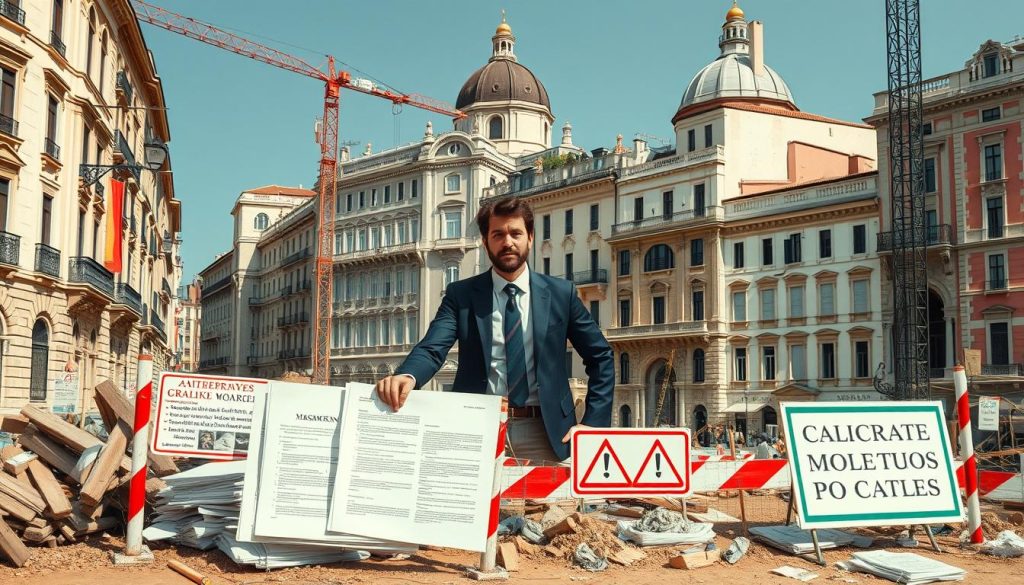
The Role of Project Management in Construction
Effective project management is key to successful construction projects. It involves many professionals like architects, engineers, and constructors. They work together to bring visions to life. A good project manager ensures the project stays on track with time, budget, quality, and safety.
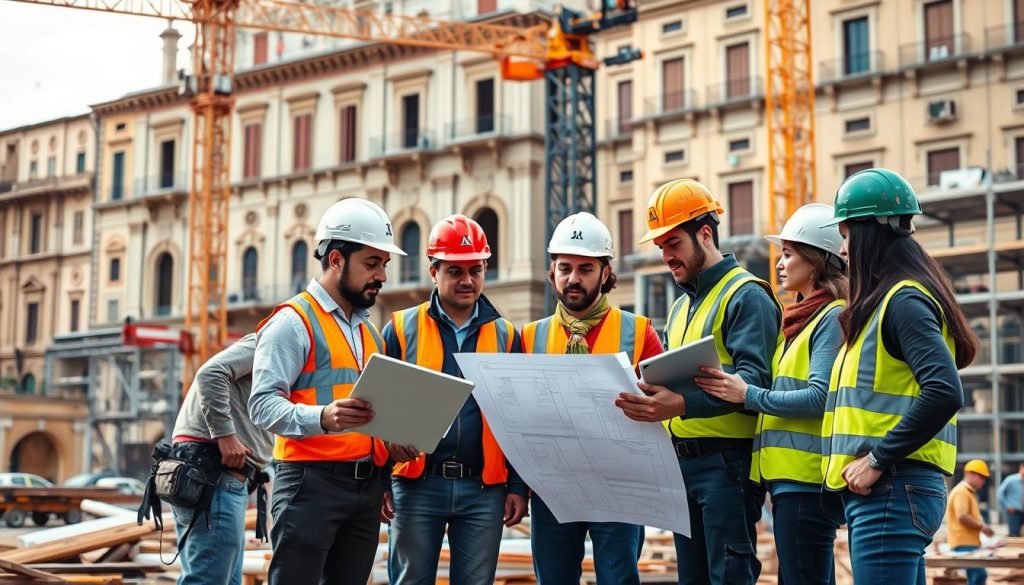
- Project planning
- Resource allocation
- Cost management
- Quality control
- Risk assessment
- Contingency planning
General contractors manage subcontractors, making sure work meets project plans and budgets. Subcontractors, like plumbers and electricians, work with general contractors to keep projects on schedule and up to quality standards. Safety officers are also crucial, ensuring a safe work environment through safety protocols and training.
Surveyors, legal consultants, environmental consultants, and permitting specialists are also vital. Surveyors measure site conditions, while legal consultants handle contract risks. Permitting specialists make sure projects get the necessary approvals.
Accurate cost estimates are essential for budgeting in construction. Schedulers work with construction managers to keep projects on time. Quality control inspectors check work quality, finding and fixing any issues.
The project management field in construction is always changing, thanks to new technologies. Project managers use tools like Building Information Modeling (BIM) and drones. They focus on managing risks and keeping stakeholders informed, making projects more efficient and successful.
Adapting to Cultural Differences in Italy
When we enter the construction industry in Italy, it’s key to understand and adapt to cultural differences. With about 10% of workers being international, valuing diversity is important. Knowing the local work habits and communication styles helps us work better together.
Italian work culture values hierarchy, showing respect for age, experience, and position. This is important in making decisions.
It’s also important to know the working hours in Italy. Private sector workers usually work from 9:00 am to 1:00 pm and then from 2:30 pm to 6:00 pm, Monday to Friday. The long August holidays are another thing to consider when planning projects and meetings.
Being aware of these cultural aspects shows we’re committed to adapting in Italy. It also makes our company seem thoughtful and well-informed to local partners.
By being culturally sensitive, we can improve our workplace relationships. Embracing local customs and understanding Italian business norms will help our success in construction. Adapting to these differences will help us navigate and thrive in the Italian business world.

